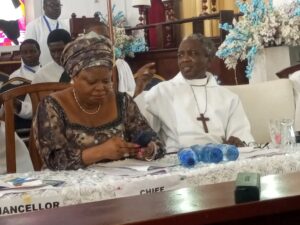The Right Reverend Babatunde Adeyemi, Bishop of the Anglican Diocese of Badagry, Lagos State, has advocated for a more transparent and accountable disbursement process for the newly established Nigerian student loan scheme. Speaking at the 3rd Session of the 7th Synod of the Diocese, themed “Pass It On: The Imperative of Sharing The Praiseworthy Deeds, Power and Wonders of the Lord With The Next Generation,” Bishop Adeyemi suggested that funds should be paid directly to student beneficiaries rather than through their respective educational institutions. This direct disbursement, he argued, would not only enhance transparency but also establish clear lines of responsibility for repayment, ensuring the long-term sustainability of the program. He further recommended involving parents in the process, reinforcing the collective responsibility for educational advancement. While commending the initiative for alleviating financial burdens on students and their families, the Bishop emphasized the importance of accountability in its implementation.
Bishop Adeyemi’s focus on intergenerational responsibility extended beyond financial matters to encompass the broader transmission of values and faith. Reflecting on the Synod’s theme, he urged parents to recognize their crucial role in shaping the next generation, emphasizing the importance of instilling the fear and love of God in their children. This, he asserted, is the primary purpose of religious institutions, transcending mere ritualistic observance. He stressed the necessity of passing on a legacy of faith and moral values to ensure the spiritual and ethical development of young people. This call to action resonated with the broader context of the Synod, focusing on the responsibility of the older generation to nurture and guide the younger generation towards a future grounded in faith and positive values.
Beyond spiritual and moral development, the Bishop also addressed practical concerns affecting the community, particularly the issue of erratic power supply in Badagry. While commending the Lagos State Government’s efforts in infrastructural development, particularly road construction, he expressed concern over the unreliable electricity supply and the estimated billing system, calling on the Federal Government to intervene and rectify the situation. This highlighted the Bishop’s concern for the overall well-being of his community, extending beyond spiritual matters to encompass their social and economic welfare.
Echoing Bishop Adeyemi’s emphasis on intergenerational responsibility, Mrs. Adejoke Orelope-Adefulire, the Senior Special Assistant to the President on Development Goals, urged parents and leaders to inspire the younger generation with hope and assurance for the future. She stressed the importance of mentorship and active involvement in children’s lives, cautioning against allowing professional pursuits to overshadow parental responsibilities. Mrs. Orelope-Adefulire emphasized the long-term benefits of investing in children’s upbringing, stating that proper training and guidance would ultimately bring peace of mind to parents in their later years. This reinforces the concept of a cyclical relationship between generations, where present investment in the young yields future dividends for both the individuals and society as a whole.
Other voices at the Synod reinforced the theme of intergenerational legacy. Mrs. Elizabeth Kappo, Vice-Chairman of Badagry Local Government, urged the passing down of a positive legacy promoting peace and harmony in the nation. Similarly, Mr. Babatunde Hunpe, the APC chairmanship candidate in Badagry Local Government and Diocesan Communicator, emphasized the importance of parents serving as role models for their children. These contributions underscored the collective responsibility of the community in shaping the future generation, emphasizing the importance of positive influences and role models in fostering a peaceful and prosperous society.
The Synod’s theme, “Pass It On,” resonated throughout the various addresses, highlighting the critical responsibility of the older generation in shaping the future of the younger generation. From financial responsibility through the student loan scheme to the transmission of faith, values, and practical life skills, the discussions emphasized the importance of investing in the next generation. The calls for improved infrastructure and governance further underlined the need for creating a conducive environment for the young to thrive. The collective message emphasized a continuous cycle of mentorship, guidance, and empowerment, ensuring a brighter future for both individuals and the nation as a whole.


